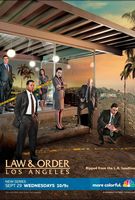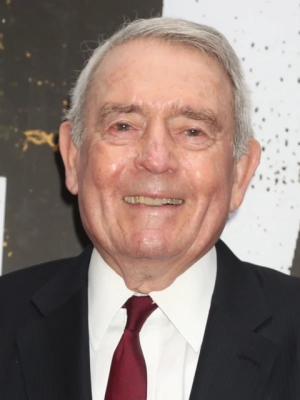Law & Order: Los Angeles Episode 1.16 Big Rock Mesa
- Terrence Howard as Deputy D.A. Jonah Dekker
- Alfred Molina as Peter Morales
- Wanda De Jesus
- Regina Hall as Deputy D.A. Evelyn Price
Rubirosa returns to Joe's garage, along with TJ, Morales and a warrant. Joe claims he got rid of any bladed tools years ago, but TJ finds a recent photo of the garage, which includes an axe. Now the DAs have three murder cases linked sketchily to three individuals in the neighborhood. Knowing he can't win, Dekker upsets Rubirosa and calls Roth to offer a deal - they won't contest Patrick's claim of murder in self-defense, as long as he serves two years for arson. If he refuses he'll face nine years. Roth instructs Patrick to tell what happened. On the second day of the fire, when the residents had snuck back to their houses in hopes of saving them.
It was getting dark, and having heard stories of looters, Patrick was scared, carrying a gun in his belt. When he saw three dirty people in his garage and one moved towards him, he shot. The other two ran, so he, Joe and Diana chased them. When the man turned on Joe, Joe hit him with an axe. The woman went crazy on Diana, who used a brick to defend herself. Panicked and convinced no one would believe them, the neighbors dragged the bodies to the homeless camp, where they set the fire, copying the first arsonist's technique. Ironically, Patrick will get a pass since he killed David in his garage, ostensibly in self-defense, but Joe and Diana will feel the full force of the law, and are quickly arrested.
The lawyer for Joe and Diana, Ron Miklin, meets with the DAs in their conference room. His clients are willing to plead involuntary manslaughter, two years, paroled in 12 months. Dekker protests - they chased their victims and nearly burned down the county! - so Joe and Diana claim it was all Patrick's idea. When Dekker will only agree to voluntary manslaughter, 11 years, Miklin says he's ready to go to trial, confident the jury will empathize with his clients, blue-collar homeowners defending themselves against looters, veritable poster kids for citizen's rights. Rubiorsa discovers that a group called Citizens for Responsible Taxation filed suit against the Big Rock Mesa homeowners, claiming that protecting homes built in a fire zone costs millions and is unfair to tax payers. One of the lawyers has a Pepperdine email address - maybe David Holloway had something to do with the suit.
Dekker and Rubirosa meet with Pepperdine law professor Angie Coles. David was one of her students, and he approached her about the homeowners in Big Rock Mesa, concerned that they were waging a campaign of terror against the homeless living in the canyon. Still, she can't see how the homeowners connected David to the lawsuit. Knowing David was wearing a Pepperdine T-shirt on the night he was killed, Rubirosa and Dekker decide to question Patrick's wife Anna. She admits they were very worried about the lawsuit, which at the very least was creating expensive legal fees. Even if they won the suit, the likelihood of losing their home to this debt was very real. Anna did overhear what went down in the garage that fateful night; someone did threaten to run them out of the canyon. While Patrick stops the interrogation before Anna can say anything else, Dekker reneges on their deal. Since Patrick withheld material information, the DA's office will re-file charges.
Later in court, Miklin tries to object to the proceedings based on marital privilege, but Dekker insists it doesn't apply here, since Anna's being asked about statements her husband made to a third party. When Anna refuses to answer his questions, Dekker receives permission to treat her as a hostile witness. Anna admits that in the moment, her husband verbally recognized David as the author of the lawsuit. She heard a shot, then ran to the garage where she saw someone lying on the ground. Patrick told her to return to the house and lock the door, which she did. On cross, Miklin asks Anna about her experience of the homeless while living in the canyon for the last eight years. She admits the constant incidents have her scared in her own home, and the night of the fire was terrifying. Patrick was trying to protect her that night, and she's proud of him. Dekker's devastated to see that Anna's testimony has moved the jury and not in the direction he wants.
Patrick testifies, claiming that David lunged for him, and that's when he pulled the trigger. The other two ran away, then attacked Joe and Diana. Covering up their deaths was stupid, but they were scared they were going to lose everything. Miklin encourages Patrick to explain. The families that live in the canyon are regular people, not wealthy movie stars, and they've withstood fires and mudslides and dirty, half-naked guys asking for beer money to hang on to their homes, where they have the right to feel safe. On cross examination, Dekker tries to establish that Patrick had a deep well of anger ready to burst when he found David, Freddy and Jenny in his garage. Patrick claims he was frightened. If so, Dekker wants to know then why didn't he back out of the garage? The truth is Patrick fired the shot when he was standing in the doorway. When Patrick protests that he was protecting his wife, Dekker points out that he was shooting towards his wife as well.
In his closing statement, Miklin insists that forensics can't show beyond a reasonable doubt what occurred at Big Rock Mesa. The idea here is to be reasonable - what would an average homeowner do in the same situation, full well knowing LA is plagued with an "occupying army" of 48,000 homeless? Dekker stands up to explain that the homeless in LA County include about 17,000 struggling veterans, and tens of thousands of children and victims of misfortune. It could happen to any of us. He asks the jury to look into their hearts to see what kind of anger they have for the homeless - the people who've overrun their parks and ask for spare change. Still, red-hot anger is not a substitute for killing in self-defense.
The jury finds all three defendants not guilty of murder, but remain deadlocked on the arson count. Exiting the courtroom, Dekker and Rubirosa see David's devastated parents sitting on a bench. The jury forewoman explains to a reporter - despite the tragedy, people are entitled to feel safe in their own homes. Maybe now the politicians will do something to get the homeless off the streets. Dekker hangs his head. He asked 12 people to put their conscience before their anger and failed. Rubirosa corrects him: he didn't fail, they did.











